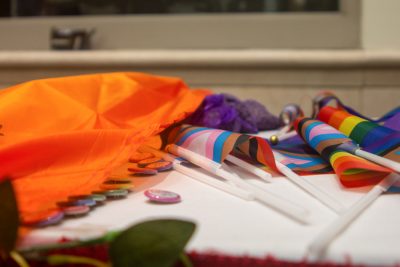The City of Somerville formally de-gendered their marriage license application on Thursday, making progress toward its goal of creating a more equitable environment for all its residents.

In the city’s press release, Mayor Katjana Ballantyne reiterated her commitment to serving the LGBTQ+ community, writing that, “the [core purpose] of a marriage license is to legally bind two individuals in love,” and should be “wholly independent of their gender identity or expression.”
While the official application produced by the State of Massachusetts will still include a field for gender identification, Somerville residents may consider this field discretionary and will no longer be required to fill out a response.
Now that Somerville has become the second major city in the state to make this adjustment, following the City of Boston who did so earlier this year, many residents of the Greater Boston area would like to see similar changes in the surrounding cities.
Brookline has already maintained an internal policy within their office to refrain from mandating that the gender and sex questions on the marriage license be answered, said Brookline Town Clerk Ben Kaufman.
“If somebody wants to have their gender on the marriage license … they can but if they don’t, we do not flag it for them or we don’t tell them they have to do it,” Kaufman said.
Prior to Boston’s official announcement in August, Kaufman and the Brookline town counsel had some inclination of what Boston was working toward, through an office employee who recently transferred from the City of Boston’s marriage department, Kaufman said.
“[This] kind of prompted our interest in making it more of an optional question,” Kaufman said.
However, this policy has been largely unofficial and for this reason, Kaufman noted that the town’s counsel has been closely following Boston’s — and now Somerville’s — civic politics and they are very interested in seeing if these actions will influence the state as a whole to reevaluate marriage licenses.
Brookline’s town counsel has been working with the Secretary of State with the purpose of obtaining updated marriage application forms that either do not have sex or gender questions entirely or it is made clear that those questions are not compulsory, Kaufman said.
Tanya Neslusan, executive director of MassEquality — the state’s leading advocacy group tackling sexual orientation and gender identity-based discrimination, according to their website — said it sets a progressive precedent, demystifying the process for other cities interested in integrating gender-neutral marriage applications.
“Any way that you can eliminate requiring gender identifiers is a good step,” Neslusan said. “You shouldn’t have to ruin the best days of your life by crossing out and explaining yourself.”
While she reiterated that the change is positive, Neslusan added her concern that these de-gendered marriage license applications may only serve as political “low-hanging fruit,” a low-risk initiative that allows the city to say they “did a good thing for this community,” but leaves other problems in the LGBTQ+ community unaddressed.
“I’m not saying it’s happening [in Somerville] because it is one of the more progressive municipalities in the state,” Neslusan said. “That said, it is something that you just have to keep an eye on because who’s getting left behind when we do the things that we probably should have had from the beginning.”






















































































































